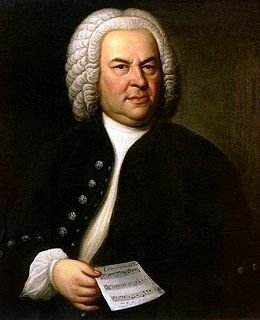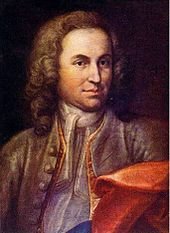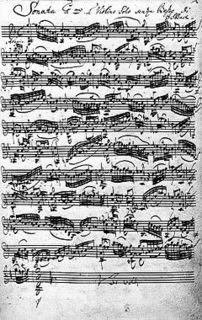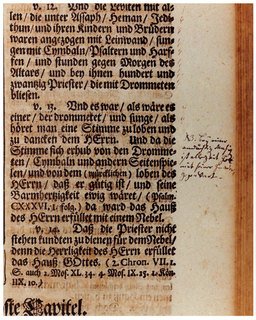
Hello everyone, as you may or may not recall, J.S. Bach's birthday was on Tuesday (or the 31st [The calendar changed during his life, so the 21st became the 31st], I met in the middle with the 26th), but I was too sick to write an article. Now, I feel ready to write this article.
Bach was one of the most brilliant composers at implementing the laws of counterpoint into his music. For those of you who don't know, the 4 rules (to summarize counterpoint) made by Nadia Boulanger are:
1. There must be 4 voices.
2. The lines (voices) must be independent of one another.
3. The lines (voices) must move at minimal distances, whilst coexisting.
4. The soprano part must be beautiful.
I will talk about how Bach used this in many of the pieces on this list (specifically Art of the Fugue). Here's a little bit about Bach:

The Life of Bach
Johan Sebastian Bach was born on March 21st (or 31st), 1685, in Eisenach, Germany (in modern times). His family was made up of numerous musicians, likely causing him to learn from a young age. His father, the director of town musicians, likely taught him to play violin, harpsichord, and understand the basics of music theory early on. Later, he would be exposed to the organ through his uncle, Johann Christoph Bach, a church organist. Many of his uncles were musicians, including a renowned composer, Johann Ludwig Bach. At the age of 10, both of Bach's parents would die, causing him to move in with his eldest brother, Johan Cristoph Bach (Not the same guy as earlier). Bach would learn much of what he knew about music, from his brother who had studied with Johann Pachelbel for three years. His brother introduced him to the music of Pachelbel, and many other composers.

In January of 1703, Bach became the court musician in the chapel of Duke Johann Ernst III. His role there was most likely composed of non-musical duties. However, during the seven months he spent here, his reputation as a keyboardist spread so much that he was invited to inspect the new organ (At [present day] Bach Church in Arnstadt), as well as give the first recital (Organs are very expensive, and you can only have 1 first recital). Because of this, he became the organist at the New Church in August of 1703, with a good salary, little responsibility, and a brand new organ tuned in a temperament, which allowed him to write in a more diverse range of keys. After leaving the church on bad terms (Calling his student a "Weenie Bassoonist" which caused the student to try and physically assault him with a stick), Bach would go to many different churches, introducing his skills as a musician and a teacher.

One of Bach's most renowned qualities as a composer, was his style. Bach was regarded as a master of counterpoint (see explanation above), four part harmony, modulations (changing keys), and ornamentation (changing a composition after completion [I.e. My First Invention post])
Sadly, Bach died on July 28th, 1750. Likely, from an unsuccessful eye operation (He was going blind). Even after his death, his music lived. Though, his style went dormant until composers such as Felix Mendelssohn began to use it again, now-a-days, Bach is one of the most famous composers ever.
10 Compositions
Here are 10 of Bach's compositions, as well as some commentary about each one.
10. Prelude and Fugue No. 1 in C major
I once heard this piece played as a prelude in church by a girl in the youth choir. It reminds me of Kleine Studie (Little Study) by Robert Schumann, likely because of the arpeggios and the major key. The fugue sounds primitive compared to some of the other fugues on this list, but it is a student piece. I will talk about fugues later under Art of The Fugue (#4).
9. Brandenburg Concerto No. 3, 1st movement
This piece is joyful, like much of Bach's stuff. It sounds very similar to Mendelssohn (Mendelssohn was inspired by Bach's work). I could imagine this being the soundtrack for that scene in Jaws when they are all playing and boating having a good time (then the Mass in B minor playing when the shark comes).
8. Minuet in G Major
This is definitely one of Bach's most famous themes. It is very relaxing! I remember playing this on guitar last year, it was fun and not so challenging. It sounds like something you'd hear on a spring morning on your way to the local bakery for an early morning date (came up with that one myself). anyway, here is the piece:
7. Wir danken dir, Gott, wir danken dir
This piece sounds triumphant and regal. I really like fast music, so Bach is a perfect match. This is really cool, and makes me wish I knew how to play the organ (one of these days I'll learn it). My goal is to someday play the organ and harpsichord, so I can write for them. They just sound really cool. One interesting thing I learned about the organ is that in Bach's time someone would stand behind the chamber, and physically pump the air in to fuel the organ (nowadays it's done electronically. The choir part also sounds triumphant. Here is another example of Bach writing music that doesn't fit his "usual" style (very counterpointingly). Anyway, here is the piece:
6. Jesu, meine Freude
This piece sounds fairly similar to Lamento Della Ninfa by: Monteverdi. I have noticed that a few of the pieces on this list have a gloomy, remorseful sound, almost like Gesualdo pieces after "the incident." I'd recommend reading that article, it is quite interesting. The title means Jesus my Joy, even though it sounds kind of sad.
5. St Matthew Passion
This piece sounds gloomy, like souls in Hell screaming for help. Yet, it retains some beauty with the mysterious sound. I have to say, I have never really heard something like this by Bach, usually it is just by the book counterpoint, even with pieces such as his mass in B minor. Of course, I have not listened to all 2 hours and 55 minutes, I'm sure there are sections that are completely counterpoint.
4. Art of the Fugue
Earlier, I watched this video to learn about what makes a fugue a fugue, and I stumbled upon this. I found it hilarious, so I've decided to also link to that. A fugue is a basic piece that incorporates a subject separately into 4 independent voices through counterpoint (see above what counterpoint is). For band, we are playing Contrapunctus V. I would also recommend Contrapunctus IV.
3. Mass in B Minor
This piece sounds rather sad compared to the other pieces I have listened to thus far. It sounds a bit like a requiem, but I know it is not. It is beautiful despite the sad (almost dark) sound. I think Bach was trying to write out a depiction of the emotion of repent (remorse), which would make sense considering it is a mass. If you listen closely, you can still hear elements of counterpoint, and hear a similar style to that of his fugues.
2. Toccata and Fugue in D minor
This piece was made famous by this advertisement for Brigantine castle. It is probably Bach's most famous piece, as a result. However, I feel that this piece should not have the number 1 slot, because I don't enjoy it as much as the number one piece. I am including it as number two, because of its fame. This piece gives me the chills, but it is still pretty cool to listen to.
1. Harpsichord Concerto no. 1 in D Minor
This is currently one of my absolute favorite pieces to listen to. I included it as number 6 in my list of 7 Piano concertos. After listening to more work by Bach, I have found that he often has the same style, and mainly focuses on counterpoint in his music. This piece is thrilling to listen to, it makes me feel like moving, or doing stuff. Which is why I listen to it when doing homework. Bach truly was a genius with music, and specifically counterpoint.
Sources
Information
Images
Previous Composer Birthdays (In order by how recent it was)
1/27 - Wolfgang (Amadeus) Mozart
The Next Birthday will be Sergei Rachmaninoff on April 1st

Also remember to check for: My weekly 7 post, As Well As My Composer Birthday Posts










